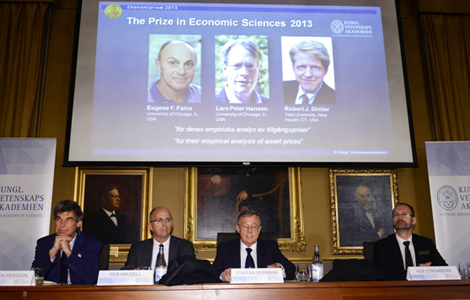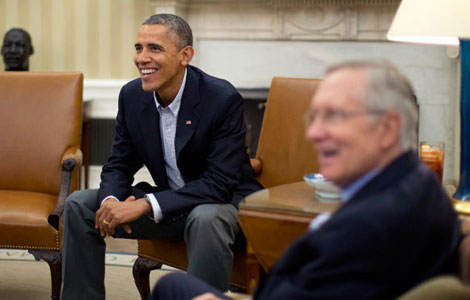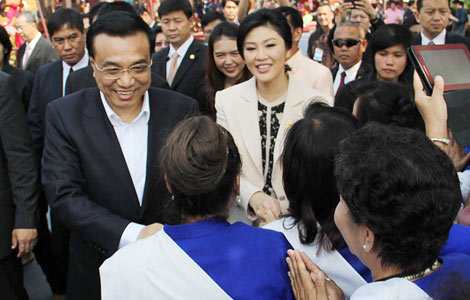UK 'open' to Chinese nuclear investment
Updated: 2013-10-15 07:37
By Cecily Liu, Zhang Chunyan in London and Lyu Chang in Beijing (China Daily)
|
||||||||
The United Kingdom has reiterated its openness to Chinese investment in the country's nuclear power industry, a senior British official has said.
"Britain is the most open economy in the world, and that goes for our energy markets as well. So there is absolutely no reason why Chinese companies can't enter our markets. I couldn't be clearer than that," Ed Davey, British energy and climate change secretary, said in an interview with China Daily.
His comments came amid heated debate about China General Nuclear Power Group's talks to share the costs of Electricite de France SA's planned power station at Hinkley Point in southwest England. The project has an estimated cost of 14 billion pounds ($22 billion).
Media reports have said that CGN's request to have greater operational control of the project has encountered national security concerns from the British government.
Mark Pritchard, a member of parliament who is also a member of the national security committee, was quoted by the Financial Times as saying that Chinese companies should take only a "minor" role in sensitive sectors such as energy.
However, Davey said that Pritchard's views do not represent the view of the British government, because he is "backbench", which means he does not hold government office.
The British government will have no objection for whatever commercial arrangements CGN and EDF reach, even if CGN becomes the majority partner in the consortium, said Davey.
"So, ultimately, these are commercial matters and, in our energy market, which is very much private, the government isn't able to tell companies how to manage relationships with other companies.
"So it will be a decision between EDF and CGN and, (whatever) they decide to do, the government doesn't have any objections," Davey said.
Last year, China National Nuclear Corp and China Guangdong Nuclear Power Corp bid in two separate consortiums against each other for a stake in the UK nuclear project Horizon, but both later withdrew without any public explanation.
The home market has long been the focus of Chinese nuclear enterprises, because China currently has the world's largest number of reactors under construction and it has so far built overseas reactors only in Pakistan.
Wu Zongxin, professor at the Institute of Nuclear and New Energy Technology at Tsinghua University, said that it is important for Chinese nuclear power enterprises to look beyond the domestic market to bigger plants in developed markets such as the UK, to lessen the potential risk of overcapacity in the domestic nuclear power industry.
"China has strong capital ability, which makes it an important investor in the nuclear power sector when many developed countries are faced with budget constraints," he said. "But the problem that determines whether Chinese firms can go out lies in the advanced nuclear power technology.
"Many State-owned companies still don't have their own intellectual property rights to produce nuclear energy facilities to meet international safety standards," he said.
However, Chinese enterprises are making huge progress in nuclear power, said Davey, who just visited China. During his trip, he held talks with several Chinese nuclear companies, including CGN, CNNC and State Nuclear Power Technology Corp.
"We recognize the strong credentials of a Chinese nuclear industry - an established track record of delivering safe nuclear power over the past 30 years," he said.
He added that British and Chinese companies' potential cooperation is not limited to the UK and China, but also in other markets.
During his China visit, Davey also signed a memorandum of understanding on offshore wind power with Wu Xin-xiong, head of China's National Energy Administration, the first of its kind that China has signed with another country.
Davey said the MOU will help remove the technological and market barriers for both countries to accelerate wind power development. He said cooperation could involve sharing technology as well as investment.

 Storm swamps car insurance firms
Storm swamps car insurance firms
 Smartphone firm rockets into the US
Smartphone firm rockets into the US
 3 US economists share 2013 Nobel Prize in Economics
3 US economists share 2013 Nobel Prize in Economics
 Canton Fair to promote yuan use
Canton Fair to promote yuan use
 Vintage cars gather in downtown Beijing
Vintage cars gather in downtown Beijing
 Riding the wave of big bargain buy-ups
Riding the wave of big bargain buy-ups
 Senate leads hunt for shutdown and debt deal
Senate leads hunt for shutdown and debt deal
 Chinese education for Thai students
Chinese education for Thai students
Most Viewed
Editor's Picks

|

|

|

|

|

|
Today's Top News
UK 'open' to Chinese nuclear investment
All 86 tourists evacuated from Mount Qomolangma
Obama hopeful as meeting nears with lawmakers
Canton Fair to promote yuan use
Over 380 detained in Moscow riot
86 trapped at Mount Qomolangma camp amid snow
Going green can make good money sense
Window cracks for progress in Iran
US Weekly

|

|







